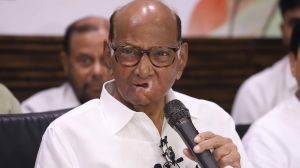‘Thorough gentleman, he pushed people to be better,’ Colleagues recall Hindi novelist Ganga Prasad Vimal
Colleagues recall Hindi novelist Ganga Prasad Vimal, who died in a road accident in Sri Lanka earlier this week.
 Ganga Prasad Vimal. (File photo)
Ganga Prasad Vimal. (File photo)
“An out-and-out Hindi man, someone who was Ajatshatru” is how Prabhat Ranjan, Hindi novelist and assistant professor at Zakir Husain Delhi College, describes well-known Hindi writer Ganga Prasad Vimal, who died in a road accident in Sri Lanka earlier this week. Vimal (80), his daughter Kanupriya and grandson were travelling to Colombo from Galle when their van met with an accident on Sri Lanka’s Southern Expressway in Kurundugahahathapma area on December 23.
Vimal, who was born in 1939 in Uttarakhand’s Uttarkashi, was the author of more than a dozen poetry collections, including Vijjap (1967), Bodhi Vriksh (1983), Itna Kuchh (1990) and Pachaas Kavitayen (2015); five novels, including Mrigaantak (1978) and Manushkhor (2013) and several short story collections. His last short story collection, Lokapriya Kahaniya (Prabhat Prakashan), was published in 2018.
“This was our only book with him, so our association with him wasn’t for long, but he was a thorough gentleman, always polite and courteous,” says Piyush Kumar of Prabhat Prakashan.
An academic who taught at Zakir Husain Delhi College for 25 years between 1964 to 1989, Vimal had also held teaching positions at Panjab University and at Jawaharlal Nehru College (1999-2004). He had also held the position of the director of Central Hindi Directorate and was part of the National Council for the Promotion of the Sindhi language during his career.
His writing apart, says Ranjan, what stands out in his long and illustrious career is his dedication to promoting the Hindi language and its writers. “His literary career is out there for people to enjoy, but he was also an excellent teacher and mentor. During his long academic career, he would identify talented young writers and promote them tirelessly. I was fortunate enough to be one of them. He would always make us meet people and send work our way. He pushed people to be better,” says Ranjan, who had last corresponded with him three years ago.












